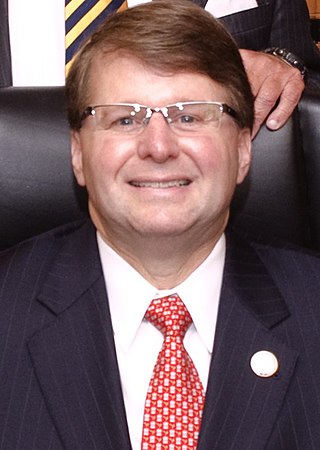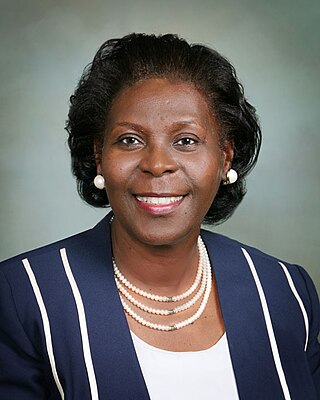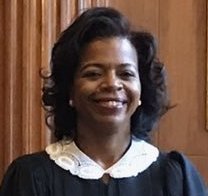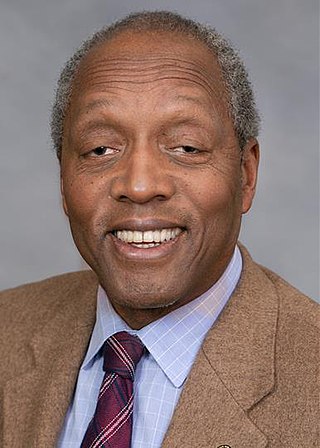
Mark D. Martin is an American jurist who served as the chief justice of the Supreme Court of North Carolina from 2014 through 2019. He was appointed by North Carolina Governor Pat McCrory to become Chief Justice on September 1, 2014 upon the retirement of Sarah Parker. Martin was already running for the seat in the 2014 general election.

The Supreme Court of the State of North Carolina is the state of North Carolina's highest appellate court. Until the creation of the North Carolina Court of Appeals in the 1960s, it was the state's only appellate court. The Supreme Court consists of six associate justices and one chief justice, although the number of justices has varied. The primary function of the Supreme Court is to decide questions of law that have arisen in the lower courts and before state administrative agencies.

Patricia Ann "Pat" Timmons-Goodson is an American judge and politician who served on the North Carolina Supreme Court from 2006 to 2012. She previously served on the United States Commission on Civil Rights and is a former nominee to be a federal judge for the United States District Court for the Eastern District of North Carolina. Timmons-Goodson ran for Congress in 2020.

Several judges of the North Carolina Supreme Court and the North Carolina Court of Appeals, the state's two appellate courts, were elected on November 2, 2004. The 2004 United States presidential election, 2004 United States House election, 2004 United States Senate election, 2004 North Carolina Council of State election and 2004 North Carolina General Assembly election were held on the same day.
John S. Arrowood is an American attorney and judge. In April 2017, Arrowood was appointed to the North Carolina Court of Appeals by Governor Roy Cooper, to replace Judge Doug McCullough, a Republican who resigned one month before he would have reached the mandatory retirement age.

Cheri Lynn Beasley is an American attorney and jurist who served as the chief justice of the North Carolina Supreme Court from 2019 to 2020; she was appointed an associate justice in 2012. Beasley previously served on the North Carolina Court of Appeals and as a district court judge in Cumberland County, North Carolina.
Samuel James Ervin IV is a North Carolina lawyer and jurist who served on the North Carolina Supreme Court from 2015 to 2022. He previously served as a state Utilities Commissioner and as a judge of the North Carolina Court of Appeals. He is the grandson of U.S. Senator Sam J. Ervin, Jr. and the son of U.S. Court of Appeals for the Fourth Circuit Judge Sam J. Ervin III.

One justice of the North Carolina Supreme Court and five judges of the North Carolina Court of Appeals were elected by North Carolina voters on November 2, 2010, on the same day as the U.S. Senate election, U.S. House elections, and other state-level elections. North Carolina judicial elections are non-partisan. Terms for seats on each court are eight years. All incumbent judges and justices who sought re-election won their respective races, except for Judge Cressie Thigpen of the Court of Appeals, who had been appointed shortly before the election and lost North Carolina's first statewide election to use Instant-runoff voting.

Albert Diaz is the chief United States circuit judge of the United States Court of Appeals for the Fourth Circuit. Diaz is the first Hispanic judge to serve on the Fourth Circuit. Prior to his appointment to the Court of Appeals, Diaz was a North Carolina state superior court judge and an appellate judge for the Navy-Marine Corps Court of Criminal Appeals.
Cressie H. Thigpen, Jr. is a North Carolina lawyer and jurist who served on the North Carolina Court of Appeals.

One justice of the North Carolina Supreme Court and three judges of the North Carolina Court of Appeals were elected by North Carolina voters on November 6, 2012, concurrently with the elections for Governor and other offices. North Carolina judicial elections are non-partisan. Terms for seats on each court are eight years. In three of the four races, incumbents were re-elected to their seats, but incumbent Court of Appeals Judge Cressie Thigpen was defeated by Chris Dillon.
The North Carolina Racial Justice Act of 2009 prohibited seeking or imposing the death penalty on the basis of race. It passed both the North Carolina State Senate and North Carolina House of Representatives and was signed into law by Governor Bev Perdue. The law was repealed in 2013.
Mark Allen Davis is an American attorney and jurist. He has served as an associate justice of the North Carolina Supreme Court (2019-2020) and previously as a Judge of the North Carolina Court of Appeals. Davis currently serves as Special Superior Court Judge for Complex Business Cases on the North Carolina Business Court.

Four justices of the seven-member North Carolina Supreme Court and four judges of the 15-member North Carolina Court of Appeals were elected by North Carolina voters on November 4, 2014, concurrently with other state elections. Terms for seats on each court are eight years.

Lucy Noble Inman is a judge of the North Carolina Court of Appeals and formerly served as a special North Carolina Superior Court judge. She won election to the appellate court in a statewide race on November 4, 2014.

One justice of the seven-member North Carolina Supreme Court and five judges of the 15-member North Carolina Court of Appeals were elected by North Carolina voters on November 8, 2016, concurrently with other state elections. Terms for seats on each court are eight years.

One justice of the seven-member North Carolina Supreme Court and three judges of the 15-member North Carolina Court of Appeals were elected by North Carolina voters on November 6, 2018, concurrently with other state elections. Terms for seats on each court are eight years. These elections were partisan for the first time since the elections of 2002. A law passed by the North Carolina General Assembly in 2017 cancelled primary elections for judicial elections in 2018 only, meaning that an unlimited number of candidates from any party could run in the general election.

Three justices of the seven-member North Carolina Supreme Court and five judges of the 15-member North Carolina Court of Appeals were elected by North Carolina voters on November 3, 2020, concurrently with other state elections. Terms for seats on each court are eight years. These elections were conducted on a partisan basis.

Abraham Penn Jones is a Democratic member of the North Carolina House of Representatives who has represented the 38th district since 2021.

Two justices of the seven-member North Carolina Supreme Court and four judges of the fifteen-member North Carolina Court of Appeals were elected by North Carolina voters on November 8, 2022, concurrently with other state elections. Terms for seats on each court are eight years. These elections were conducted on a partisan basis.







